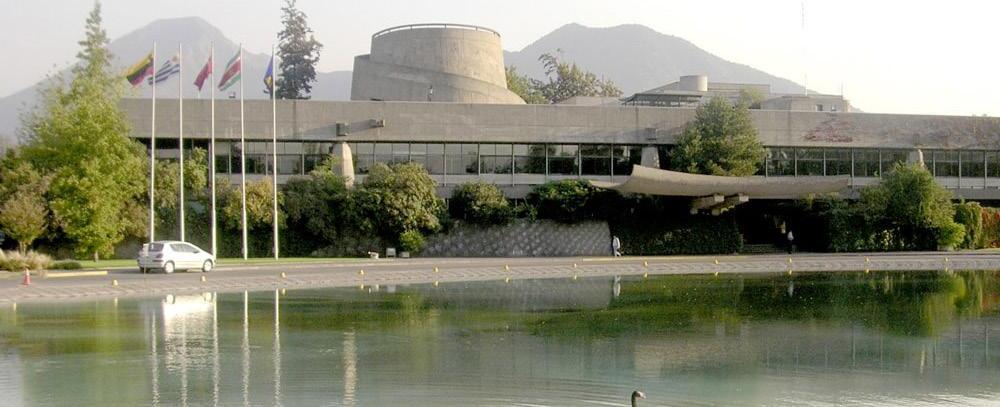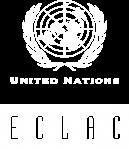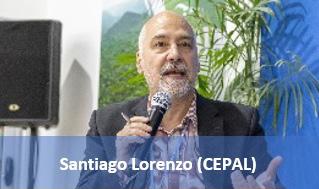eclac undergoes change
AT THE HELM IN 2022
latin america and caribbean
PARLIAMENTARIANS SIGN JOINT STATEMENT ON CLIMATE FINANCE AT COP27 the
caribbean's first
GREEN GLOBECERTIFIED AIRPORT IS IN ARUBA

Volume 9 - Issue 12
About us Belize
Issued on a monthly basis, The Hummingbird offers insights into the latest projects, publications, technical assistance missions and research carried out by ECLAC Caribbean. In addition to these, sneak previews are provided of the most salient upcoming events, alongside enriching followups to previously covered issues. With a view to featuring a variety of facets of Caribbean life and lifestyle, The Hummingbird also zooms in on cultural activities and landmark occurrences through an eye-opening regional round-up.
EDITORIAL TEAM
Editor: Johann Brathwaite


Copy Editor: Denise Balgobin
Proof Reader: Veera Deokiesingh-Fraser
Publication Design: Liseanne Martin-Subero
Please see our contact details on the back cover of this magazine.

workshop
change
indicators A HUMMINGBIRD FEATURE: ECLAC undergoes change at the helm in 2022 Latin American and Caribbean parliamentarians sign joint statement on climate finance at COP27 The Caribbean’s first Green Globe-certified airport is in Aruba Foreign Direct Investment in Latin America and the Caribbean increased in 2021 … but not to pre-pandemic levels 4 6 14 16 18 14 18 6
addresses climate
and disaster
International Days
4 January World Braille Day
24 January
International Day of Education

27 January
International Day of Commemoration in Memory of the Victims of the Holocaust
Upcoming Meetings
16 JANUARY 2023
ECLAC will organize the third edition of the Regional Water Dialogues in February 2023

16 JANUARY 2023

The economics of biodiversity in climate change times: A renewed challenge for Latin America and the Caribbean - A conversation with Sir Partha Dasgupta
17 JANUARY 2023
XXIX Meeting of the Presiding Officers of the Regional Council for Planning of the Latin American and Caribbean (ILPES)
belize worKshop
ADDRESSES CLIMATE CHANGE AND DISASTER INDICATORS
One of the highlights of ECLAC’s end of year activities for 2022 was a regional workshop to address coordination and data sharing challenges for better environment, climate change and disaster indicators in the Caribbean.
The workshop was one of the activities undertaken by ECLAC as part of the ongoing project on relevant climate change and disaster indicators for evidencebased policies for Caribbean SIDS. The project is designed to enhance the statistical and institutional capacity of the beneficiary countries to measure climate change and disaster events, with a view to improving policy coherence in line with the
implementation of regional and international agreements, notably the Sustainable Development Goals (SDGs), the SAMOA Pathway, the Paris Agreement, the Sendai Framework, and the Escazú Agreement.
The workshop, held in Belize from 9 to 11 November, was jointly organized by ECLAC, the Statistical Institute of Belize, and the Ministry of Sustainable Development Climate Change and Disaster Risk Management.

The Caribbean is threatened by climate change, particularly the small island developing States (SIDS). Belize is no exception. The country is situated in the tropical
cyclone belts and is directly exposed to the forces of the oceans. As a small geographical area, disasters might affect vast proportions of the country. Availability of high-quality statistics and indicators are, therefore, crucial to effectively respond to the effects of climate change and build resilience.
In her opening statement at the workshop, ECLAC Caribbean Director, Diane Quarless, expressed satisfaction at the Commission’s arrival at the “last lap” of the project, which started in 2020 and is scheduled to end by mid-year 2023.
4|The Hummingbird
Regional Caribbean ferry
RETURNS TO ANTIGUA
Regional Caribbean ferry service, in the form of L’Express des Iles, has returned to the island of Antigua. The ferry made its first trip to Antigua from Guadeloupe recently, after a nearly three-year hiatus due to the pandemic, carrying 415 passengers in a charter trip.
A delegation from the Antigua and Barbuda Tourism Authority, led by CEO Colin C. James, was on hand to welcome the group of visitors.
L’Express des Iles is the leading ferry company in the Eastern Caribbean, with a network that includes Guadeloupe, Martinique, Les Sainte, Marie Galante, Dominica and Saint Lucia.

The ferry’s parent company, Jeans for Freedom, has already announced more trips planned for April and May 2023.
“We look forward to growing this business with Jeans for Freedom because it’s great to connect Antigua and Barbuda with our regional brothers and sisters. Antigua and Barbuda has always been a regional hub by air, and now we hope also to have it be a regional hub by sea,” said Colin C. James, CEO of the Antigua and Barbuda Tourism Authority.
She said: “This project initiative responds to the expressed concern of insufficient data in the subregion raised by the CARICOM Secretariat (CCS) during the last two biennial meetings of the United Nations system with the CCS, and more recently at the Caribbean Development Roundtable (CDR) and the Caribbean Development Cooperation Committee (CDCC) meetings last month in Suriname.”
Quarless added that with the implementation of this project, ECLAC, in collaboration with the UN Statistics Division, aims to improve the production, dissemination, use, and sustainability of environment, climate change, and disaster indicators. “To achieve this, we need to enhance the technical capacity of National Statistical Offices (NSOs), as well as other data producers, such as Ministries of Environment, Climate Change, Agriculture, Forestry, Fisheries, and disaster and emergency management agencies.”
Participants included technical personnel from various government ministries, Statistical Offices, and other Institutions that produce or use environment, climate change related, and disaster risk management data. The participants were trained to construct selected environmental, climate change, and disaster indicators and their metadata, identify data and capacity gaps necessary to develop an Environmental Information System (EIS).

The Hummingbird |5
ECLAC undergoes change
AT THE HELM IN 2022

6|The
Hummingbird
The United Nations Economic Commission for Latin America and the Caribbean (ECLAC) experienced a major change in leadership during 2022. After 14 years leading the Commission with her signature dynamism, political acuity and charm, Executive Secretary Alicia Bárcena bade us farewell in March 2022. Deputy Executive Secretary Mario Cimoli held the reins in the intervening period until September, when Executive Secretary José Manuel SalazarXirinachs, was appointed to head the Commission by United Nations Secretary-General António Guterres. The Hummingbird recognizes the service of these three leaders in this edition.
read more

The Hummingbird |7
ALICIA BÁRCENA
Mexican diplomat, Alicia Bárcena, concluded her mandate as Executive Secretary of the Economic Commission for Latin America and the Caribbean (ECLAC) on 31 March 2022, after nearly 14 years of stewardship characterized by the Commission’s critical assessment of inequality, and its key multidimensioned impact on development processes and human progress in the countries of the region.
During a farewell ceremony from ECLAC headquarters in Santiago, Chile, held in her honour, Bárcena said: “Today I conclude this fruitful cycle as the highest authority of ECLAC. This has been the brightest phase of my professional career. For nearly 14 years, I have contributed to giving weight, influence and opportunity to the body of transformative, progressive and egalitarian convictions that distinguish ECLAC’s present thinking.”
Bárcena took office on 1 July 2008, when she was appointed by then UN Secretary-General, Ban Ki-moon, becoming the first woman to hold the post. She led the work of the Commission as a center of excellence and research applied to public policies on sustainable development, a forum for
regional intergovernmental and multi-stakeholder dialogue on sustainable development, and a provider of technical cooperation to countries.
As Executive Secretary of ECLAC, she emphasized the organization’s structuralist thinking, and the central role that equality plays in strengthening a development pattern that combines economic growth, social inclusion and environmental sustainability.

During her administration, Bárcena ushered in a prolific period in which ECLAC’s way of thinking was consolidated. That thinking was characterized by a set of progressive ideas for the region. It sought to suggest and promote how to overcome the structural obstacles that have hindered deep democratic advances, and the material and cultural progress of Latin America and the Caribbean.
In the words of UN Secretary-General António Guterres, Bárcena “led a progressive and visionary administration. She was one of the first at the UN to position equality in its multiple manifestations, including gender equality, as the cornerstone of sustainable development and to highlight the specific challenges of middle-income countries.”

Among the many initiatives that make up her legacy, five in particular stand out: (1) the Comprehensive Development Plan for El Salvador, Guatemala, Honduras and south-southeast Mexico, in order to address the structural causes of migration; (2) the Plan for Self-Sufficiency in Health Matters in Latin America and the Caribbean, which seeks to strengthen the capacities for research, development, production and access to vaccines and medicines throughout the region, with emphasis on actions to promote regional integration; (3) the Caribbean First initiative, a strategy that aims to elevate and strengthen the Caribbean’s place as a fundamental part of our region and to expand opportunities for integration and cooperation; (4) financing for development along a regional dimension; and (5) the Regional Agreement on Access to Information, Public Participation and Justice in Environmental Matters in Latin America and the Caribbean (Escazú Agreement), which is an unprecedented treaty that seeks to ensure a healthy environment and sustainable development for present and future generations through societies that are better informed and more participatory, fair and inclusive.
“The current role and weight of ECLAC, the value and importance of its voice, the influence and impact of its ideas, although many times have had me as their spokeswoman, are the fruit of the often anonymous work of the women and men that make up the Commission. ECLAC has truly been, for us, the fertile territory of shared convictions. The tool conducive to giving concrete shape to our shared quest for dignity, justice and equality,” Bárcena concluded.

continued from page 7
8|The Hummingbird
MARIO CIMOLI
Mario Cimoli was appointed Deputy Executive Secretary of ECLAC on 1 August 2018, and remained in that position until 30 March 2022. He was Acting Executive Secretary from 1 April to 30 September 2022.


Cimoli, a PhD from the University of Sussex in the United Kingdom and Full Professor of Political Economy at the Ca' Foscari University of Venice in Italy, has more than 20 years’ work experience in the United Nations and ECLAC.

Within ECLAC, he has served as Economic Affairs Officer of the Division of Production, Productivity and Management (1999-2009), Head of that same division’s Innovation and ICT Unit (2009-2010), Director of the Division of Production, Productivity and Management (2010-2018), and Officer-inCharge of the Division of International Trade and Integration (2015-2020).
His extensive publication record reflects a substantial contribution to the fields of micro and macroeconomic policies, with a focus on development paths, economic growth and the interconnections between industrial policy, technological development and innovation.
In addition, he was Co-Director of the Industrial Policy Task Force of Intellectual Property Rights Regimes for Development Task Force, along with Giovanni Dosi and Joseph E. Stiglitz, of Columbia University (2004-present).
The Hummingbird |9
JOSÉ MANUEL SALAZAR-XIRINACHS



10|The Hummingbird
Costa Rican economist, José Manuel Salazar-Xirinachs, became the eleventh Executive Secretary of the Commission on 1 September 2022, and assumed duties on 3 October 2022. In making the announcement, UN SecretaryGeneral, António Guterres, highlighted Salazar-Xirinachs’ interest and passion for the analysis, design, implementation and evaluation of policies to promote development.
The former Regional Director for Latin America and the Caribbean of the International Labour Organization (ILO) between 2015 and 2018, Salazar-Xirinachs holds a master’s degree in Development Economics and a doctorate in Economics from Cambridge University, along with a bachelor’s degree in Economics from the University of Costa Rica. He joined the ILO in 2005 as Executive Director of its Employment Sector and served as Assistant Director General for Policy from 2013 to 2015. Prior to joining the ILO, he served from 1998 to 2005 as Director of the Trade Unit of the Organization of American States (OAS).
Guterres stated.

The new Executive Secretary of ECLAC served as Executive President of the Costa Rican Development Corporation from 1988 to 1990 and Chief Economist, as Executive Director of a Central American private-sector think tank (FEDEPRICAP) from 1990 to 1996, and as Minister of Foreign Trade of

Costa Rica from 1997 to 1998.
In the academic sphere, he is the author of numerous publications on development, trade, productive transformation, competitiveness and even employment policies. He has taught at the University of Costa Rica, the National University of Heredia, Cambridge University and Georgetown University.
In his perceived mission for ECLAC, Salazar-Xirinachs, has recognized that Latin America and the Caribbean remains in need of transformative and bold policies that offer realistic and pragmatic solutions to the acute shortcomings and economic, social and environmental gaps in the countries of the region. These, he said, would resolve many of the most basic needs, especially of poor and vulnerable populations.
Executive Secretary SalazarXirinachs has thus seized the reins of the organization with fresh energy and insight, with the support of the members of the Commission behind him.
Junkanoo is back
IN THE BAHAMAS
After two years off amid the pandemic, The Bahamas’ greatest art form is making its triumphant return for the holiday season.
Junkanoo, The Bahamas’ national cultural festival, returns for its largest celebration in the heart of downtown Nassau on Boxing Day, 26 December through to 2 January.
It’s one of the signature events of the year in Nassau, as the sights and sounds of Junkanoo fill Bay Street and the rest of the capital.
Junkanoo dates back centuries; while scholars are undecided about the origin of the festival, theories range from its establishment by legendary West African Prince John Canoe to a three-day holiday for enslaved people in The Bahamas in the 1700s.
“The holidays are a particularly wonderful time to visit The Bahamas, and this December is extra special as it marks the return of The Bahamas’ famous Junkanoo celebrations”, The Bahamas’ Ministry of Tourism said in a statement.

12|The Hummingbird
The festival represents the “rich heritage of the African diaspora and is a colorful tradition that speaks to the strength and resilience of the Bahamian people”, the statement said.
Junkanoo festivities are also held concomitantly across the country, from Grand Bahama to Bimini, Eleuthera to Abaco, Long Island to Cat Island, Inagua, San Salvador and Andros.

This winter’s Junkanoo comeback follows a successful return of the country’s Junkanoo Summer Festival.
 PHOTO CREDIT: PXFUEL
PHOTO CREDIT: FLICKR | DEUSXFLORIDA
PHOTO CREDIT: PXFUEL
PHOTO CREDIT: FLICKR | DEUSXFLORIDA
|13
The Hummingbird
LATIN AMERICAN AND CARIBBEAN PARLIAMENTARIANS
SIGN JOINT STATEMENT ON CLIMATE FINANCE AT COP27

Fourteen parliamentarians from 11 countries in Latin America and the Caribbean signed a joint statement on 10 November 2022, during a side event at the 27th Conference of the Parties to the UN Framework Convention on Climate Change (COP27). Held in hybrid format, the event, entitled, "Latin American and Caribbean Parliaments Leading: mobilizing climate financing", was organized by ECLAC, with the support of the European Union, through the Euroclima+ Program, and the Open Society Foundations (OSF).
From the Euroclima+ Pavilion, in the city of Sharm el Sheikh, Egypt, and through a digital platform, parliamentarians participating in the Parliamentary Observatory on Climate Change and Just Transition (OPCC) signed a joint statement that expressed the leading role of parliaments in the just transition to sustainable and low-carbon economies, especially in terms of climate finance.
From the Caribbean, signatories were Gwendell Mercelina, Member of Parliament for Curaçao, Veronica
Dorsette Hector, Montserrat Parliamentary Secretary, Melvin “Mitch” Turnbull, Minister of Natural Resources and Labor, British Virgin Islands, and Otis Morris, Minister of Home Affairs, Transportation, Broadcasting, Energy and Utilities and Telecommunications Commission, of the Turks and Caicos Islands.
The OPCC was conceived from a recognition of the need to strengthen interparliamentary cooperation so that those responsible for formulating
14|The Hummingbird
policies could review and approve the legislation, relevant to said transition through a Parliamentary Observatory on the subject.
In 2021, the creation of the OPCC was announced, with the aim of constituting a shared information tool on the status of legislation and environmental parliamentary treatment in the region. Since then, the OPCC has identified 271 current environmental laws (423 if decrees are included) and 189 environmental bills in the last two years in Latin American and Caribbean countries.
The joint statement, signed within the framework of COP27, reaffirms the commitment to the co-construction of a concrete agenda of actions to promote information access and the design of climate policies. In this sense, the OPCC will continue promoting the exchange of experiences and proposals, the follow-up of legislative discussions and the dissemination of government actions in the area of just transition.



In addition, the statement highlights the main preliminary findings of the OPCC's first policy brief, which is under development, and will present a comparative study of climate change framework legislation in the countries represented in the OPCC, including the issue of climate finance.
The parliamentarians who signed the Declaration commit to “promote the development of the financial structure that allows the raising of public and private funds, as well as international cooperation funds, for adaptation, mitigation and loss and damage projects, as well as working on urban and rural resilience, capable of facing the climate crisis” and to “articulate mechanisms to supervise the resources granted to our countries for the fight against climate change under principles of effectiveness, efficiency, legality, transparency, impartiality, reliability and quality”.
The Hummingbird |15
The Caribbean’s first
GREEN GLOBE-CERTIFIED AIRPORT IS IN ARUBA
The Caribbean is replete with Green Globe-certified hotels, properties doing their part to support a sustainable future. The certification covers everything from operations to green energy to water use, with 44 core criteria supported by more than 380 different compliance indicators.
And while Green Globe has also certified golf courses, businesses, attractions and restaurants, it has never covered an airport. Until now.
The Queen Beatrix International Airport in Aruba has made history as the world’s first-ever Green Globecertified airport.
“As a busy tourism hub, Aruba Airport has set the benchmark for the Caribbean aviation industry,” said Green Globe CEO, Birte Pelayo. “Airport operations can greatly contribute to lowering emissions

through on-ground innovations and supporting better flight planning. And as an essential transport infrastructure, the economic and social contributions that airports make are vital to economies underpinned by travel and tourism.”
The certification comes as the airport has made a significant push toward sustainability, including pilot waste projects, reduction of energy consumption, lowering of carbon emissions and even changing its purchasing policies.
“Aruba Airport is taking the lead, not only in the Caribbean, but globally, being the first airport to be certified under the Green Globe International Standard for Travel and Tourism, the highest level of certification for operation and management of a travel and tourism business,” Pelayo said “Aruba Airport has indelible connections to the prosperity of
16|The Hummingbird
Aruba and its sustainable success will deliver tangible and measurable benefits for all in the community.”

The Airport also has an initiative called Wings of Hope, a workgroup focused on social community projects to help the local community in Aruba, in accordance with the United Nations’ Sustainable Development Goals.

“When Aruba Airport Authority set out its sustainability goals and objectives, we expected and aimed to be able to reach certain levels of certification in the two years ahead,” said Joost Meijs, CEO of Aruba Airport Authority.
“We set ambitious goals and in such a short period of time, was able to become the first airport in
the world to have achieved Green Globe certification, exceeding our initial expectations. This shows the enormous commitment of our staff and other partners to conduct business with respect to our environment.”
The Hummingbird |17
FOREIGN DIRECT INVESTMENT
LATIN AMERICA AND THE CARIBBEAN INCREASED IN 2021 … BUT NOT TO PRE-PANDEMIC LEVELS
In a newly published report, ECLAC is calling on the countries of the region to use foreign direct investment (FDI) to strengthen and develop capacities that would contribute to sustainable and inclusive development.

In a context of weak economic recovery, Latin America and the Caribbean (LAC) received US $142.794 billion in FDI in 2021, 40.7 per cent more than in 2020, but this growth was not enough to achieve the levels seen prior to the pandemic, according to ECLAC’s report, entitled “Foreign Direct Investment in Latin America and the Caribbean 2022”.
Globally, FDI inflows increased by 64 per cent in 2021, reaching approximately US $1.6 trillion. As a destination for global investments, LAC saw its share decline, however, representing nine per cent of the total – one of the lowest proportions in the last ten years and far below the 14 per cent recorded in 2013 and 2014.
According to the report, the reactivation of investments in 2021 occurred in all subregions. In the Caribbean, Guyana recorded the greatest
growth in inflows, surpassing the Dominican Republic, which in prior years had been the leading recipient of investments in the subregion.
The services and natural resources sectors, with increases of 39 per cent and 62 per cent, respectively, were the most dynamic sectors, the document indicates. In the manufacturing sector, the decline in FDI inflows in 2021 (-14 per cent) was attributable to decreased investments in Brazil.
The European Union and the United States were the main investors in the region in 2021, representing 36 per cent and 34 per cent of the total, respectively.
“In a region with low overall investment levels, foreign direct investment is critical for designing production policy,” ECLAC’s Executive Secretary, José Manuel SalazarXirinachs, emphasized.
“For foreign direct investment to have a positive impact, it is necessary to coordinate productive development policies with the attraction of highproductivity investments, in activities that would support
virtuous development processes in terms of inclusivity, employment quality, environmental sustainability, innovation and technological complexity. The cascading crises that the region is experiencing force us to define strategies to position Latin American and Caribbean countries on the world stage for investments,” he warned.
According to the report, Latin America and the Caribbean, with 660 million inhabitants, is projected as the market that will have the world’s greatest growth in the sale of imported pharmaceutical products between 2021 and 2026. The pharmaceutical industry in the region is small (0.4 per cent of the region’s GDP and 0.2 per cent of employment), but it has high productivity, employs skilled workers, and the salaries are higher than in the rest of the manufacturing industry.

For these reasons, the region needs sectoral strategies and mechanisms for identifying high quality investments, complemented by stimulus for domestic investment and local research and development, ECLAC underscored.

18|The Hummingbird


The Hummingbird |19
THE KITCHEN
Aruba’s Pastechi
Aruba has a national dish that is a must-try for any visitor - the pastechi. This savoury pastry is similar to a turnover or empanada and is typically filled with cheese, chicken, or beef. The dough is deep-fried to perfection, making it crispy on the outside and soft and fluffy on the inside. Whether you enjoy your pastechi for breakfast, lunch, or dinner, you are sure to appreciate this delicious Aruban staple. So, the next time you feel adventurous in the kitchen, why not give the pastechi a try!
What you will need:
DOUGH
• 4 cups of flour 1 tbs. of baking powder
• 1 tsp. salt
• 1 tbs. sugar
• 2 tbs. vegetable shortening
• 2 tbs. margarine
• 1 egg beaten
• 1 cup of water
PREPARING THE MEAT FILLING:
• 1 lb. finely chopped beef without fat
• 1 tbs. margarine
• 1 medium onion, finely chopped
• 1 small green sweet pepper, finely chopped

• 1 celery stalk, finely chopped
• 2 tbs. raisins
• 1 tbs. piccalilli hot red pepper, finely chopped, to taste
• Soy sauce
• Freshly ground black pepper
• Cumin
How to Make it:
Step 1: In large frying pan combine all ingredients except beef. Cook over medium heat, stirring till well combined and onion and celery are soft. Add beef and cook till well combined while stirring.
Step 2: Roll the dough into a very thick sheet, then cut out circles about three inches in diameter. Place one tablespoon filling in the center of one pastry circle. Top it with a second circle.
Step 3: Lightly moisten edges and press the circles together. Fold or roll the edges over slightly and flute them as pie crust.
Step 4: Fry the pastechis in deep, hot vegetable oil until golden brown.
Step 5: They may be prepared in advance and heated in the oven just before serving.
20|The Hummingbird

The Hummingbird |21
CONTACT US
CONTACT US

ECLAC Subregional Headquarters for the Caribbean,
1 Chancery Lane, P.O. Box 1113, Port of Spain, Trinidad and Tobago.
ECLAC Subregional Headquarters for the Caribbean, 1 Chancery Lane, P.O. Box 1113, Port of Spain, Trinidad and Tobago, West Indies.
MEDIA CONTACT
Telephone: 1 868 224 8000
Tel.: 1 868 224 8075
E-mail: registry@eclacpos.org
E-mail: eclac-media-pos@eclac.org
MEDIA CONTACT
Tel.: 1 868 224 8075


E-mail: media-pos@eclac.org
SOCIAL MEDIA
SOCIAL MEDIA




CLICK HERE OR SCAN THE QR CODE TO VISIT OUR WEBSITE...


























 PHOTO CREDIT: PXFUEL
PHOTO CREDIT: FLICKR | DEUSXFLORIDA
PHOTO CREDIT: PXFUEL
PHOTO CREDIT: FLICKR | DEUSXFLORIDA

















